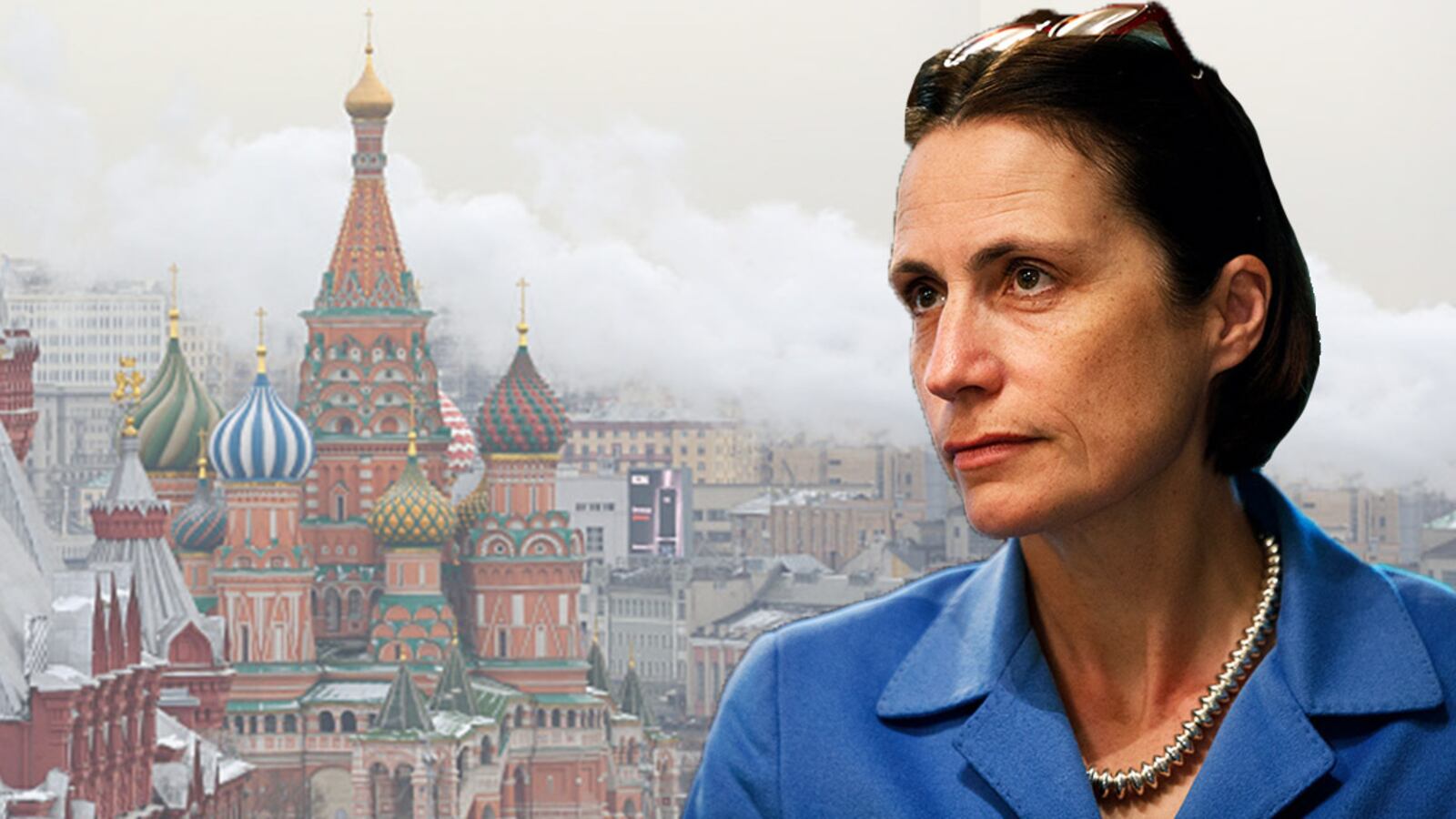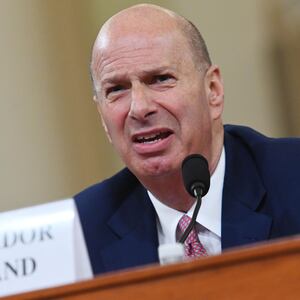Until she resigned her post effective Aug. 1, British-born Russia scholar Fiona Hill held a key position in the White House overseeing and coordinating the administration’s relations with the former Soviet Union, Russia and Europe. She coined the phrase “the Gordon problem,” identifying to her colleagues at the National Security Council the pressure campaign against Ukraine orchestrated by Ambassador Gordon Sondland at the behest of President Trump and his personal attorney Rudy Giuliani.
And she literally wrote the book—which Trump clearly did not read—on Mr. Putin: Operative in the Kremlin and Putin’s two-way “protection racket” between himself, as the CEO of Russia Inc. and his crony oligarchs.
Hill takes the witness table Thursday morning in the House impeachment hearings alongside David Holmes, the career State Department official who overheard Sondland telling Trump that the president of Ukraine “loves your ass” and would do whatever Trump wants.
Hill will be there to provide a capstone to the damning testimony putting the president at the center of the controversy over Ukraine. She will corroborate her role in blowing the whistle internally at the White House last summer about what her boss, then National Security Adviser John Bolton, characterized as a “drug deal” he wanted nothing to do with.
At Bolton’s urging, she conveyed his concern to White House lawyer John Eisenberg that Rudy Giuliani, acting as Trump’s personal lawyer, is a “hand grenade” that is going to “blow everybody up.”
Hill can speak with firsthand knowledge about the tactics that Sondland used to muscle his way into the administration’s handling of Ukraine policy, elbowing aside experts like herself and Lt. Col. Alexander Vindman.
Hill was an unconventional choice for a president smitten by right-wing populism and Putin-style authoritarianism. She was recruited to the NSC by Trump’s first national security adviser, Gen. Michael Flynn, who is awaiting sentencing for lying to the FBI, and his then-deputy, K.T. McFarland, whose career got sidelined by legal and political roadblocks.
Born into a family of coal miners in northern England, the 54-year-old Hill is a dedicated academic with a reputation for careful scholarship and commitment to patriotic duty. She has dual U.K-U.S. citizenship and holds advanced degrees in Soviet studies and history from Harvard. Fluent in Russian, she joined the National Intelligence Council in 2006 as an intelligence officer for Russia and Eurasia, serving the U.S. intelligence community. In that capacity, she worked with Christopher Steele, the former British spy whose “Steele dossier” is central to GOP conspiracy theories.
Her association with Steele will surely come under fire from the Republicans. She has dismissed the dossier as a “rabbit hole” that is contaminated by Russian disinformation.
If Trump had read (or been briefed on) her book, he never would have given her a plum position on the NSC overseeing the administration’s relations with Europe and Russia. Her views about Putin are antithetical to the affinity Trump expresses for him at every opportunity.
Unlike Vindman, Hill was not on the infamous July 25 call. She had submitted her resignation and effectively left the White House by then. But her testimony, first offered behind closed doors last month, highlighted the discomfort within the administration among foreign-policy professionals and thrust Bolton into the spotlight.
Bolton tasked her to report his discomfort to Eisenberg, as opposed to doing it himself. Why? He is a well-known bomb-thrower with no love lost for the Russians. Contrast that to Hill, who’d been on leave from the Brookings Institution, the epitome of the Washington establishment, and the author of a scholarly book about Putin.
Her friends and colleagues were surprised when Hill accepted the NSC posting after the 2016 election. It seemed an unlikely match. Two and a half years later, it is not surprising that Bolton would see her as an ally in calling out the administration’s unseemly and dangerous hold on military aid to Ukraine in exchange for that government’s commitment to investigate a debunked conspiracy theory about the 2016 election, and to provide what Trump likes to call “opposition research” on his potential 2020 challenger, former Vice President Biden.
With co-author Clifford Gaddy, an economist who specializes in Russia, Hill documents how Putin collapsed “the Russian economic and political systems (to become) private and informal,” focused on Putin and a half-dozen individuals with decades-long ties to Putin and who now derive their power from him as “Real decision-making resides inside the inner circle, while Russia’s formal political institutions have to varying degrees been emasculated.”
Sound familiar?
Speaker Pelosi last month at the White House confronted Trump, saying, “All roads with you lead to Putin.” Hill’s testimony could shed light on the curious affinity that Trump has for Putin, and how it has affected U.S. national security in the eyes of the professionals who took an oath to support and defend the Constitution—as did the president.
Several witnesses in the impeachment hearings made the point that Russia benefits from any weakening in Ukraine’s standing with the West, and that countering Russian aggression begins with a strengthened Ukraine.
Much like Trump uses tariffs and lawsuits, Putin is quick to use economic and trade levers in domestic and foreign-policy disputes, “deploying tax inspectors against domestic opposition figures and dragging them into court to answer accusations of economic crimes,” turning off gas supplies to Ukraine in 2006 and 2009, and imposing import bans against Ukrainian chocolate in 2013. “Putin came to see the free market as a tool, an instrument, as well as a source of new opportunity,” Hill and Gaddy write.
Putin no longer sees the West as a model worth emulating—politically gridlocked, mired in debt and overextended in foreign entanglements, they write. And he sees himself as “the only person capable of effectively countering threats to Russia,” which “reinforces Putin’s conviction that he has to maintain his grip on power.” Trump argued in 2016, “Only I can fix this.”
Hill identifies Putin’s multiple identities, six in all, that he employs to advance his goals: the Statist, History Man, Survivalist, Outsider, Free Marketeer, and Case Officer. Most relevant to understanding Putin’s relationship with Trump in the context of Ukraine are the “Statist,” restoring and strengthening the Russian state, which puts Ukraine at the center of Putin’s aspirations, and the “Case Officer,” which brings in his KGB training, which Hill and Gaddy write “is all about recruitment, using all the intelligence officer’s tools to profile individuals, seek out vulnerabilities, exploit them and turn a target into an asset, an agent.”
In the book’s foreword, Strobe Talbott, then president of Brookings and a former State Department official who dealt with Russia during the Clinton administration, writes about his first meeting with Putin in the 1990s, when “he let me know, not so subtly that he’d studied my dossier, mentioning in passing the early 20th-century poet about whom I’d written a dissertation in graduate school. I found it more of a warning than a compliment (‘We know all about you...’)”
Trump famously said in 2016, “Russia, if you’re listening, I hope you’re able to find the 30,000 emails.” Russia is always listening, and what we’ve learned from Dr. Hill and others is how willfully oblivious this president is to the consequences of his words and actions.







